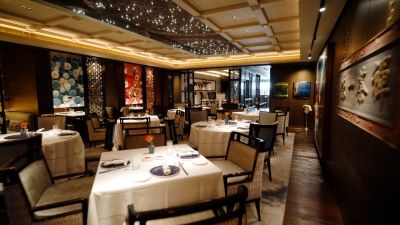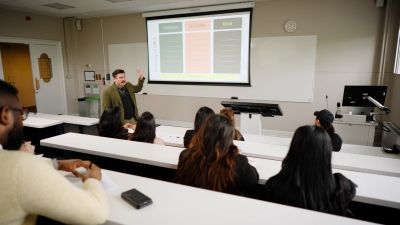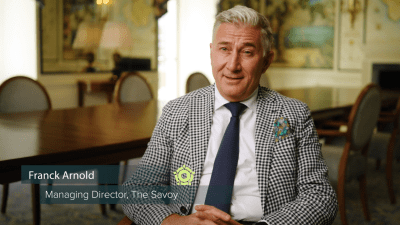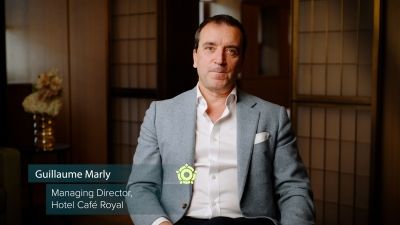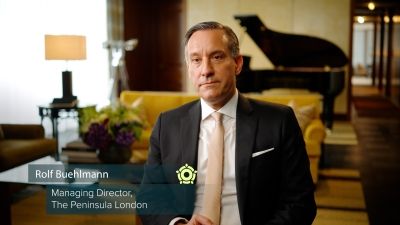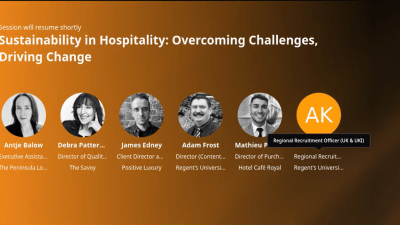Programme information
Overview
Learn to serve, lead and innovate in the luxury hospitality sector.
Created in partnership with world-leaders in luxury hospitality, this highly practical course explores all aspects of the industry – from operations and accounting to marketing and guest experience – shaping you into a seasoned hospitality professional, confident to serve, manage and lead in the luxury space.

Graduates will leave uniquely poised to enter the workplace – a fast track to a management career within a powerful network of well-known brands.
Adam Frost, Director (Content) Luxury Hospitality Management
Why Regent's?
- An intimate campus: located in the heart of London’s royal Regent’s Park
- Unparalleled global connections: gain exposure to leading industry professionals
- Future-facing: an innovative curriculum structure that's unique to Regent's
- Small class sizes: max. 15 students, enabling individual support and guidance
- In-hotel training: tangible, practical training in luxury venues from term one
- Prime location: access to London's luxury hotels and Michelin-star restaurants
- Powerful connections: ongoing partnerships with leading properties
- Career progression: potential to accelerate your journey to management
Our partners
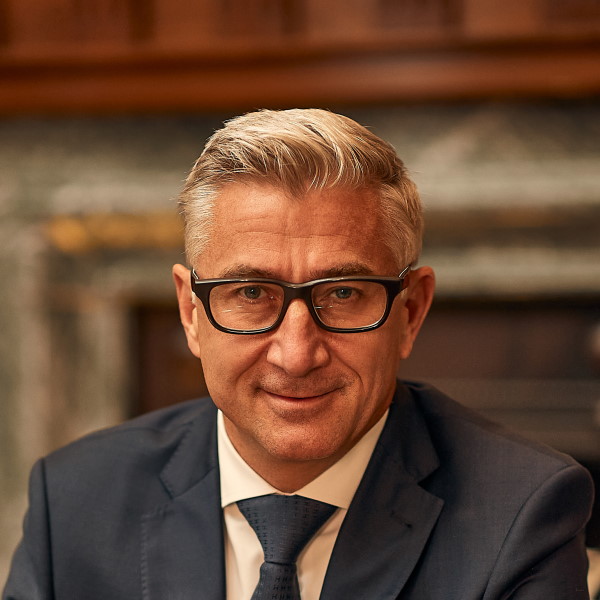
Hospitality is in need of new programmes and Regent's University London has decided we're going to design things based on the actual needs of the profession. That is very different!
Franck Arnold, Managing Director at The Savoy London

In the UK, finding graduates with hands-on experience in luxury hospitality operations is challenging, and this course bridges that gap.
Guillaume Marly, Managing Director at Hotel Café Royal
What to expect
Developed in partnership with some of the world’s most recognised hospitality venues, including iconic five-star hotels The Savoy, The Peninsula London and Hotel Café Royal, this highly practical course has been purpose-built to address the unique challenges and opportunities at the forefront of this exclusive industry – diving into every facet, from operations and accounting to marketing and guest experience.
You’ll experience hands-on learning, with opportunities to explore some of London’s most reputable five-star hotels and restaurants and develop your understanding of how luxury businesses are run. From term one, you’ll be placed in your first luxury property – working two days a week on site in a variety of positions, applying your learning practically while building a powerful network of contacts.
In your final year, you’ll complete a major project, comprising two parts – a piece of written work (a business plan, consultancy project, etc.) and a practical exercise (e.g., an industry placement). As your confidence grows, so will your ability to exercise judgements, take risks, handle crises and adapt to change.
You’ll graduate with a strong skillset and a network of contacts in the luxury industry – all looking for new talent to lead, innovate and influence the hospitality sector.
This course offers a direct pathway to our MA Luxury Hospitality Management.
London-centric learning
With London on your doorstep, you’ll have opportunities to experience British service excellence first-hand in the capital:
- Attending exclusive tours and immersive challenges
- Working at iconic venues: The Savoy, The Peninsula London and Hotel Café Royal
- Joining hospitality labs at landmark London locations
A tailored experience
We put you in the driving seat – shaping your education from day one:
- Your own support officer: receive tailored advice and support when needed
- Academic guidance: regular one-to-one sessions and a unique open door policy
- Flexible modules: personalise your course with a choice of special electives
- Additional language classes: prepare for domestic and international opportunities
Foundation year
In your Foundation year, you'll gain a solid grounding in academic skills and principles, as well as an introduction to your chosen subject area. It will provide a rich and varied experience to ensure you’re prepared for degree-level study in the UK – ready to develop specialist knowledge and confidently make the most of your course.
Some modules will be taken with students heading towards the same or related subject areas, while others will be taken with a blend of students – enabling you to mix with peers who bring a range of different perspectives and experiences to the classroom. You’ll take two modules related to your subject area and eight shared modules covering key skills like communication, critical thinking, cultural understanding, politics, data, creativity and entrepreneurship.
Once you’ve successfully completed your Foundation year, you’ll directly progress to Year 1 of your chosen degree-level course.
How to apply
Applying to Regent's is quick and easy. We accept direct applications year-round and there's no application fee. If you haven't received your exam results, you can still apply and we'll issue you with a conditional offer. You just need be clear in your application which qualifications you're currently studying for.
Step 1: Apply
- On our website, details here
- Through UCAS (The Regent’s UCAS code is R18)
During the application process, you'll have the chance to upload supporting documents, including:
- A copy of your passport (photograph ID page)
- Academic transcripts and certificates from all previous studies
- A 300-500 word personal statement (view guidance)
- If you're not a native English speaker, proof of your English proficiency (take our test)
Credit transfer
If you’ve already studied part of your degree elsewhere, you may be able to apply for Recognition of Prior Learning (RPL) and join your new course at an advanced entry point. To apply for RPL, you'll need to state this clearly in your application and provide us with the certificates, transcripts and module descriptions for your previous course.
Step 2: Receive a response
You can expect to receive a decision on your application within 10 working days. We'll assess whether you meet our entry requirements and will notify you of our decision via email. UCAS applicants will also receive official notification via the UCAS system.
For some of our courses, the selection process may include an interview or audition. They can take the form of a one-to-one interview, a group interview or a portfolio review, which may be conducted by telephone or online. Arrangements of these are made between you and the Admissions department.
Step 3: Accept your offer
If you wish to accept your offer, you must pay your (non-refundable) advance tuition fee deposit. This will confirm your place. Here's how.
Step 4: Register
Closer to the start of term, our Admissions team will send instructions regarding your registration process. This will include information on completing your online enrolment before you arrive, as well as a checklist of documents you'll need to bring with you to campus.
Information for international students
If you're an overseas student, you'll likely require a visa to study in the UK. Here's how to apply.
Scholarships and funding
There are a wide variety of funding and scholarship opportunities to help you finance your studies. For more information, please visit our scholarships and funding page.
Fees
Tuition fee:
- £25,000 per year for the intake starting in September 2024 or January 2025
- £26,000 per year for the intake starting in September 2025 or January 2026
Non-refundable advance deposit:
UK students: £1,000
International students: £4,000
Read more about tuition fees.
When do I need to pay?
If you receive an offer for a course, you’ll receive a pro forma invoice. To accept your offer and secure your place, pay your deposit payment as soon as possible.
The remaining portion of your first year’s tuition fees will be due when you enrol. At this time, you’ll receive your invoice for the full year. You can choose to pay for the year in full before the start of your first academic year or in two instalments, spread out across the academic year. The dates of these instalments will be determined by when your course starts.
What do fees include?
Fees cover the cost of all tuition and access to the University’s IT infrastructure and library learning resources. Fees are presented for the first level of study which equates to two terms.
What other costs should I budget for?
You will need to budget additional funds for accommodation and living expenses, travel, and any additional trips, visits, activities or courses that you choose to participate in outside of the tuition offered as part of your course.
The library holds a limited number of copies of core textbooks and where possible in e-format. You will be encouraged to purchase your own textbooks and will need to budget approximately £80-£100 per year, depending on your course.
How you'll learn
At Regent's, you’ll have the freedom to explore your interests in a dynamic, supportive and collaborative environment with interactive classes, industry opportunities, specialist facilities and tailored careers advice – ensuring you develop the skills, experience and confidence you need to secure your dream job.
You’ll pair academic knowledge with hands-on experiences – exploring current issues and proposing solutions to real challenges. Classes incorporate:
- Practical training in London hotels and restaurants
- Immersive challenges
- Creative workshops and labs
- Industry speaker events
- Business simulations
- Creative masterclasses
- Seminars & tutorials
- Group research tasks
- Case preparation
- Technology supported work (chat/e-portfolio, etc)
- Student driven/negotiated sessions
- Accompanied/independent visits to venues/experience centres
A key component of this course is active industry engagement and live on-site work experiences. Starting with hospitality labs taking place on site at landmark London locations to provide fundamental industry knowledge. This course also features an additional internship to cement fundamental learnings, increase contact with industry partners and open doors for management traineeship in internship and beyond.
Based in London, you'll also have opportunities to meet industry leaders and employers through guest lectures, live briefs, events and field trips.
Contact hours
14 hours per week of timetabled classes.
10-14 hours per week in-class and 16 hours per week of practical, on-site training.
Teaching staff
You'll be taught by a mix of industry experts and research-active academics who have extensive global experience. They’ve published journals, books, news articles and magazine columns, appeared on documentaries and been quoted in outlets from Forbes to the Financial Times. They've also worked with brands including Meta, Microsoft and Coca Cola. Their knowledge and experience ensure classes are always shaped by the latest technologies and trends. You’ll also:
- Attend guest lectures with leading businesses and brands
- Be allocated a personal tutor, who you’ll meet with regularly on a one-to-one basis
Independent learning
Throughout your time at Regent’s, you'll be expected to undertake extra reading, research, revision and reflection – working alone and collaboratively with classmates.
Method of assessment
Your knowledge and skills will be assessed via a range of task-based challenges, reports, presentations, briefs and more – ensuring your learning is always:
- Inclusive – fostering a student-focused approach
- Engaging – encouraging interaction and participation
- Authentic – based on real business challenges
Disability support
We welcome and support students with a wide range of disabilities and health concerns. Please speak to us as soon as possible, so we can provide the help you need.
Academic requirements: Foundation entry
We're interested in your potential, as well as your prior achievements – and review each application comprehensively on its own merit.
One of the following qualifications:
- 5 GCSEs at grade A-C or equivalent or Grade 5 average
- US High School (Year 11) with a minimum GPA of 2.3/4.0 or completed diploma with a minimum GPA of 2.0/4.0
- 24 points in the International Baccalaureate (Year 1)
- Equivalent qualifications as deemed acceptable by the University and set out in the Admissions Guide and UK ENIC.
English language requirements
Minimum English proficiency requirement through one of the following qualifications (or equivalent):
| Qualification | Subject | Grade |
|---|---|---|
| GCSE* | English language | C (4) |
| IB SL or HL* | English A | 4 |
| IB HL* | English B | 4 |
| US HSD (studied in a majority English-speaking country)* | Grade 11 and above English | D |
| IELTS* | Academic | 5.5 overall and 5.5 in each component |
Please note, we do not accept home/online editions of English language tests.
*Qualification satisfies the English language requirements of the UKVI for non-UK/Irish nationals.
We also offer conditional students a free, online, diagnostic test known as the Regent’s English Proficiency Test (REPT). This must be booked in advance. Discover more.
Academic requirements: Year 1 entry
We're interested in your potential, as well as your prior achievements – and review each application comprehensively on its own merit.
One of the following qualifications:
- Three GCE A-levels at grade A-C
- 24 points in the International Baccalaureate
- US High School Diploma with a minimum GPA of 2.5 PLUS one of the following:
- Three AP tests with an average grade of 3 (or two, with an average grade of 4)
- SAT score of 1100 (550+ in both subjects)
- ACT with a composite score of 26 (20 in each section)
- Dual Enrolment and College credits (1st year) – 30, with a GPA of 2.5 or higher
- Equivalent qualifications as deemed acceptable by the University and set out in the Admissions Guide and UK ENIC.
As well as:
- A 300-500 word personal statement outlining your passions and goals
- An interview (please see below)
English language requirements
Minimum English proficiency requirement through one of the following qualifications (or equivalent):
| Qualification | Subject | Grade |
|---|---|---|
| GCSE* | English language | C (4) |
| IB SL or HL* | English A | 4 |
| IB HL* | English B | 4 |
| US HSD (studied in a majority English-speaking country)* | Grade 11 and above English | C |
| IELTS* | Academic | 6.0 overall and 5.5 in each component |
Please note, we do not accept home/online editions of English language tests.
*Qualification satisfies the English language requirements of the UKVI for non-UK/Irish nationals.
We also offer conditional students a free, online, diagnostic test known as the Regent’s English Proficiency Test (REPT). This must be booked in advance. Discover more.
Interview
In addition to meeting our academic and English language requirements, this course also requires you to pass an interview. Once you've applied and submitted your supporting documents, and we've assessed your eligibility, successful candidates will be invited, and can choose to attend in person or online.
Careers
Graduates can work in a wide range of roles, including:
- Area manager (F&B, Rooms, Sales, Restaurant, Spa etc.)
- Beverage programme manager
- Event planner
- Cruise director
- Guest relations manager
- Travel consultant
- Concierge
- Guest experience coordinator
- Quality assurance manager
- Personal butler or assistant
- Luxury property developer
- Entrepreneur in the luxury hospitality industry
- Luxury travel blogger or influencer
You'll graduate with the transferable skills needed to choose any career that aligns with your interests.
Graduate visa
After you've completed your course, you may be eligible to apply for a Graduate visa. This enables you to work or look for work in the UK for up to two years after you leave Regent's, without the pressure of having to secure a job immediately.
Careers support
Don't worry if you feel overwhelmed – our Careers, Enterprise and Industry team are here to provide personalised advice and access to resources for life!
- 24/7 access to online guidance and resources
- Exclusive internships, networking opportunities and industry events
- Personalised consultations – from interview and CV prep to business advice
- Access to Handshake, connecting you with 650k+ global employers
The Regent's Model
We've designed our curriculum for you – expanding your knowledge, skills and thinking with three building blocks:
- Subject Core
- Special Electives
- Industry & Entrepreneurship
Read more about how you'll learn and view a list of Special Electives. Please note, all Special Electives are subject to availability.
This is a full-time course, comprising three terms of study each year for three years.
View your academic calendar.
Integrated Foundation option
Business Foundation
| Term 1 | |
|---|---|
| Business I: Enterprise in Action – Fundamentals in Context |
This module is essential for you to understand how businesses operate and are managed. Your learning will be highly experiential and, from the outset, your focus will be to launch and run a live business-start-up with other team members. You will explore core principles and concepts from the world of business, identifying both internal and external factors that contribute to both business success and failure. You will then assess and apply these to your own business model. You will face challenges that range from developing your USP and raising finance, to understanding marketing options. The module will culminate in a dynamic investor pitch designed to test your idea. The ability to work with others will also be a key feature throughout. You will examine leadership and management styles and explore how team dynamics affect the business culture, while also identifying your own strengths and attributes and reflecting on your own performance. |
| Writing for Success at University |
This module develops your writing skills and knowledge, to prepare you for success at university. You will consider writing as a process that is shaped by your knowledge of genre, audience and purpose – and you’ll learn to identify common features of successful academic writing. Engage with motivating writing challenges that support the skills required in the Foundation, and the skills you will need to complete written tasks at degree-level. You will explore aspects such as style, register, structure and referencing, and learn to harness digital tools to aid your writing. In this module, you will take on board feedback and use it to develop further. You will also reflect on the overall process of becoming a more proficient academic writer, all within a supportive classroom atmosphere. As a result, you be able to approach your assessment tasks with confidence, demonstrating your learning in written tasks across your studies. |
| Critical Thinking | In a world of conflicting ideas and the advent of "post-truth" and "fake news", being able to think critically and investigate information is crucial. This module is designed to improve your critical thinking and reflecting skills. You will learn tools that will help you evaluate information, investigate what is true, differentiate between opinion and fact, and determine strong arguments from weak. Understanding how we know what we know is one of the most fundamental aspects of university education and, in this module, you will develop a foundation in decision-making and reasoning that will help you academically and in your future career. |
| Cultural Understanding | In this module, you will study a range of cultural industries – contemporary, historical, local and global. You will trace how ideas develop in different cultural industries from inception to materialisation, explaining the values that underpin cultural output. You will develop your understanding of the role that curiosity and creativity have played in the development of culture and the technologies used within the cultural landscape. You will consider decision-making processes, gaining an understanding of how cultural industries are created, how culture is mediated and produced, and what impact it has on its human and physical environments. The module will encourage you to engage with specific case studies, and provide a broader understanding of the social, political and economic contexts that contribute to the place of culture in society. |
| Politics, Society and Citizenship | In this module, you will be introduced to the basic principles of politics, society and citizenship. What is society, and how is it shaped by politics? Who are we as citizens? You will explore your political values by examining some real-world problems and debating with other students about how to deal with them. By working with other students, you will explore how political engagement works within and across societies. By the end of the module, you will have the tools to develop a more critical and thoughtful attitude to citizenship, which you will take forward for the rest of your life. |
| Term 2 | |
| Business II: Enterprise in Action – Rising to the Challenge |
This module is designed to harness your entrepreneurial aspirations, while contextualising your academic learning, as you continue to run your team’s business start-up. You will learn about marketing and investment opportunities, before implementing a digital marketing campaign to promote your product or service. You will be actively selling – online and at physical selling events and a trade fair – while continually revising your business model to optimise a return. At Regent’s we are also keen to promote sustainable approaches to business and are conscious that tomorrow’s global leaders should embrace social entrepreneurship. As such, this module will also focus on how you can embed such practices within your current and future endeavours, using ex-student case studies to highlight such global successes. Further psychometric testing will allow you to focus on yourself as an individual, identifying your unique strengths and emotional intelligence profile. You will explore how these can increase your engagement and satisfaction, both personally and professionally. |
| Communication |
Communication is the power to inform, persuade and bring people together to enact change. Whether verbal, non-verbal or written, communication is key to your success in university and future career. This module will enable you to improve your own communication and to evaluate the way communication works to convey ideas. Taking an active approach, you will work through complex stories and messages, finding new ways to communicate simply, clearly and effectively. You will practice observation, understand and evaluate context, and learn to empathise with your audience to craft persuasive and professional outputs. Reflecting on culture and identity is an important part of understanding the communication environment. You will work with and draw on your own experience, and that of your peers, to acknowledge differences and find connections. |
| Creativity and Entrepreneurship |
In a business environment, creativity is most often defined as the ability to imagine the unique ideas whilst innovation is defined as the process that transforms the creative ideas into real commercial product or services. Starting from this point of view, this module will help you to critically evaluate how creativity contributes to successful entrepreneurship practice. Today’s organisations are aware of the importance of entrepreneurial and managerial creativity as a desired behaviour in identifying opportunities that lead to entrepreneurial success. In this module, you will have the opportunity to understand the role of managerial creativity for growth and wellbeing of organisations and in society. You will cover topics such as innovative organisations; entrepreneurial creativity and decision making; transformational leadership; creative behaviour; employee innovation; and engaging with the creative process in the workplace. |
| Cultural Industries | In this module, you will study a range of cultural industries, whether contemporary or historical, local or global. Tracing how ideas develop from inception to materialisation in different cultural industries will enable you to explain the values that underpin cultural output. You will develop your understanding of the role that curiosity and creativity have played in the development of culture and the technologies used within the cultural landscape. By considering decision-making processes, you will gain an understanding of how cultural industries are created, how culture is mediated and produced, and what impact it has on its human and physical environment. The module will encourage both an engagement with specific case studies and a broader understanding of the social, political and economic contexts that contribute to the place of culture in society. |
| Making Use of Data |
Data are all around us and play a crucial role in decision-making at all levels and sectors. The analysis and visualisation of data is a key skill in today’s job markets. It is not only the foundation of efficient organisations, but a means unlocking critical insights to inform present and the future operations. In this module, you will gain a conceptual appreciation of the nature of data in its many forms, and how we use it to enhance daily working processes. You also gain an appreciation of the ethical issues around data governance and representation. You will gain practical knowledge in data analysis by exploring the broad ecosystem data analytics platforms, and by building up key skills in Microsoft Excel, the most popular data analytics platform in the world. Throughout a series of applied sessions, you will use these skills to effectively explore, visualise, and analyse data of all kinds. |
Luxury Hospitality Management
Year 1
| Core modules | |
|---|---|
| Food and Beverage Concepts | This module will introduce you to the luxury hospitality business from the perspective of food and beverage. It will develop your understanding of business practice, analysis, food hygiene and market strategy. |
| Rooms Division Management | Develop your understanding of hotel operations, department structure, business practice and market strategy. This module involves a Rooms Division Lab, providing you with the opportunity to work in industry and apply what you’ve learned in class. |
| Applied Food and Beverage Management | Explore the intricacies of food and beverage providing and gain an expansive view of product and production from a luxury operational perspective. You’ll gain practical experience through a Food & Beverage Lab, where you’ll apply your learning in real industry settings in London. |
| Hospitality Accounting, Cost Control and Inventory Management | Gain an overview of the financial and control systems commonly used in the luxury hospitality industry. Engage with data analysis and implementation, and examine how it affects decisions. |
| Learning Perspectives | This module will develop your curiosity around your chosen degree specialism and encourages you to become a collaborative, critical and reflective learner. You will explore different approaches and key debates around learning and develop skills essential for university study. Learning from key thinkers across cultures and time, you will examine core questions about how and why we learn the way we do. You will gain understanding through the distinct lens of your subject and by comparison and sharing of ideas with students from all degree areas. To evidence your learning journey, you will create responses to key questions on the areas of the module you find most relevant and inspiring. The skills, knowledge and approaches to learning you develop in this module will support your Regent’s journey and assist you in becoming an active part of your university community. |
| Then, choose from Global Perspectives or a Language module | |
| Global Perspectives | Through this module’s challenges you will complete a number of practical group tasks inspired by contemporary intercultural, political and social issues, and by the concept of global citizenship. You will work with peers to propose and present solutions to dilemmas and global issues. In the first half of the term, groups will be divided based on disciplines and courses of study; in the second half, you will re-group with students from other disciplines. Throughout the collaboration, you will be asked to reflect individually, and to evaluate the benefits and limitations of specific disciplinary approaches versus the potential for creative solutions when working with students across disciplines. |
| Languages (Grades 1-6) – available Autumn and Spring | Choose between Arabic, Chinese, French, German, Italian, Japanese, Russian and Spanish – all languages are offered from beginner to advanced level in every term. Languages provide you with tools to understand and imagine new worlds and communicate with others. Learning a language opens the door to cultures beyond your own and allows you to bridge the gap between communities and build connections for your life and your career. At Regent’s, you will learn languages differently. You will learn in a highly practical way, in order to develop skills for authentic communication. At Regent’s, you will receive individual attention in a supportive atmosphere and learn through collaboration and innovative teaching methodologies. Whether you want to start learning a new language, develop existing proficiency or prepare yourself to study abroad, these modules will help you develop a multilingual identity. |
| Advanced Language for Professionals (Grade 7) – available Autumn or Spring | If you want to work in international or multilingual environments and you already have a higher intermediate level of Arabic, Chinese, French, German, Italian, Japanese, Russian or Spanish, this module is for you. You will learn to apply your existing language skills to the workplace and acquire the practical and linguistic tools to connect, collaborate and communicate effectively in multicultural professional settings. Learning in small groups, you will gain knowledge of the countries where the language is spoken and of their work practices and will apply that knowledge to tasks that resemble those in the workplace. You will also develop job-specific linguistic and cross-cultural skills and explore contemporary forms of communication at professional levels. Immersed in a unique classroom environment that embodies Regent’s cosmopolitan character, you will experience individual attention in a supportive atmosphere, learn through innovative teaching methodologies and develop your multilingual professional identity. |
| Advanced Spanish through Film (Grade 8) – available Autumn or Spring | Comics, films, social media posts...we live in a multimodal world where information is conveyed through combinations of visual, written, and spatial modes. If you already have a higher intermediate level of Spanish and wish to develop an ability to understand how images are created and ‘read’, this module is for you. Through close study of a range of films and television series produced in Latin America and Spain, you will enhance your understanding of the sociocultural reality of those countries. You will become familiar with the multimodal framework and apply it to the analysis of audio-visual texts. You will also acquire practical and linguistic tools to discuss and analyse in Spanish, and with a certain level of complexity, any audio-visual product. In addition to expanding on your existing linguistic skills, this module will help you develop new and highly valuable media literacies that can be easily transferred to your subject. |
| Business English: Professional Writing – available Autumn or Spring | Every professional journey will benefit from enhanced writing skills allowing you to express yourself and persuade others. Classes provide opportunities to create written texts (such as work emails, letters, proposals and reports) while developing understanding of writing as a process and how to adapt writing for diverse audiences and purposes. At the same time, you will also consider the impact of choices around tone, style, formality and other key language aspects. This module offers a memorable experience of professional writing, harnessing technology use (such as digital word lists, text analysers) and formative feedback, all within a supportive classroom atmosphere. As a result, you will be ready to apply what you learn to tasks on this module in your university course or career. You may only take this module once. |
| Business English/Advanced Business English – available Autumn or Spring | For every prospective 21st century professional, higher-level business English skills are indispensable. Whether you study acting or psychology, business or fashion design, this module will develop business English knowledge (grammar and vocabulary) and skills (listening, speaking, reading and writing) at upper-intermediate and advanced levels, to enhance your fluency, persuasiveness and effectiveness as a global communicator. You may only take these module once. Classes provide opportunities to engage in motivating linguistic challenges (such as discussions, presentations and reports). You will select and introduce business topics of interest and enjoy multiple opportunities for formative feedback, all within a small group, supportive classroom atmosphere. The sessions will encourage you to reflect throughout, helping to improve confidence through tasks designed to showcase the full range of business English skills required for success in your future career. |
Year 2
| Core modules | |
|---|---|
| Marketing, Branding and Guest Experience | Explore the dynamic and changing world of marketing, branding and communications within the luxury hospitality industry – from press releases to crisis management. Special attention will be paid to internal communications, as well as the management of guest experience and feedback to deliver customer excellence. |
| Organisational Development | Explore all aspects of organisational development – from selecting the right talent to managing company culture and progression. You’ll also explore the importance of cross-cultural management and diversity, equity and inclusion practices. |
| Industry Placement I – Operations: Experiencing Industry and Entrepreneurship | You’ll gain valuable hands-on experience through a placement in hospitality operations, with the option to specialise in either food and beverage or rooms division – applying the skills you developed in Year 1 in a real workplace environment. Development of soft skills and fundamental operation acumen are key facets of this placement. |
| Facilities Safety and Security Management | As future managers in luxury hospitality, it’s critical for you to understand how to manage and maintain facilities to the highest level of excellence. In this module, you’ll learn how properties are maintained, how to employ a risk mitigation strategy in operations and how to minimise expenditure. |
| Industry Placement II – Management: Experiencing Industry and Entrepreneurship | This placement module gives you the chance to experience a real workplace setting. You’ll apply your learning and develop practical management skills, as well as a critical appreciation of how a luxury hospitality organisation operates and evolves. These insights won’t only prepare you for your next level of study, but they’ll also help you build the attributes required to realise your future ambitions after graduation. |
| Special Elective or Language II | Choose from: Creativity and Imagination; Inspiring Your Audience; Being Human; Future Cities Now; Creating a Brand Identity; Why We Post: Social Media and Us; Financial Innovation and Technology; Photography Workshop; How to Think in a Post-Truth World; Understanding Human Rights; Literary London; Behind the Lens: Introduction to Media Production; Psychology of Emotions; London as Fashion Capital; Emerging Technologies: from Web3 to the Metaverse; Digital Design with Adobe Creative Suite; The Power of Language in Your Life; Business Ethics; Experiencing Theatre; Understanding the Global Art Market. Scroll to the top of the page to find a link to the complete list with module descriptions. Please note, not all electives will be offered each term, due to timetabling and other constraints --- OR, select a language module. You can choose between Arabic, Chinese, French, German, Italian, Japanese, Russian, Spanish and Business English – all offered from beginner to advanced. Scroll to the top of the page to find a link to the complete list with module descriptions. |
| Special Elective or Language I | Choose from: Creativity and Imagination; Inspiring Your Audience; Being Human; Future Cities Now; Creating a Brand Identity; Why We Post: Social Media and Us; Financial Innovation and Technology; Photography Workshop; How to Think in a Post-Truth World; Understanding Human Rights; Literary London; Behind the Lens: Introduction to Media Production; Psychology of Emotions; London as Fashion Capital; Emerging Technologies: from Web3 to the Metaverse; Digital Design with Adobe Creative Suite; The Power of Language in Your Life; Business Ethics; Experiencing Theatre; Understanding the Global Art Market. Scroll to the top of the page to find a link to the complete list with module descriptions. Please note, not all electives will be offered each term, due to timetabling and other constraints --- OR, select a language module. You can choose between Arabic, Chinese, French, German, Italian, Japanese, Russian, Spanish and Business English – all offered from beginner to advanced. Scroll to the top of the page to find a link to the complete list with module descriptions. |
Year 3
| Core modules | |
|---|---|
| Organisational Change and Project Management | Change management is crucial to navigating a successful and sustainable future for any luxury hospitality business. This module will provide you with a variety of project management tools in support of seizing new opportunities and managing change successfully. |
| Revenue Management and Pricing Strategy | Pricing and revenue strategy can drive the financial success of any hospitality organisation. In this module, you’ll learn to analyse performance and evaluate the revenue management practices employed. Using your critical and analytical skills, you’ll be able to able to recommend practices that will ultimately enhance performance and drive organisational success. |
| Major Project I | The Major Project is the culmination of your studies. You will study Major Project I in the first term of your final year and Major Project II in the second. Each module comprises 20 credits. Together, the two modules form one project. The Major Project is a substantial piece of work, drawing on your discipline-specific and interdisciplinary learning, together with your learning about industry and entrepreneurship. You will have the freedom to design a self-directed project that reflects your interests and career aspirations. You may also choose to relate your Major Project to work you’re completing on your other final year modules. In Major Project I, you will start the term developing a proposal for your Major Project, supported by your tutors. Following your proposal, you will begin work on your Major Project, learning through individual or group supervision, workshops or studio practice, as appropriate to your project. |
| Major Project II | Major Project II is the second Major Project module in your final year. Following the research and development you undertook in Major Project I, you will realise and complete your work in Major Project ll. The Major Project is your opportunity to apply your discipline-specific and interdisciplinary learning, together with your learning around industry and/or entrepreneurship to a topic of your choice. Through the Major Project, you can realise your ambitions as you prepare to graduate with work that illustrates your aspirations. You will learn through individual or group supervisions, workshops or studio practice, as appropriate to your project. You may also choose to relate your Major Project to the work you’re completing on your other final year modules. If you are working on an entrepreneurial project for your Major Project, you may be able to join the Founders Programme, which supports students and graduates interested in starting their own business with tailored guidance, coaching, mentoring, and access to experiential bootcamps and live events. |
| Special Elective I |
Choose from: Creativity and Imagination; Inspiring Your Audience; Being Human; Future Cities Now; Creating a Brand Identity; Why We Post: Social Media and Us; Financial Innovation and Technology; Photography Workshop; How to Think in a Post-Truth World; Understanding Human Rights; Literary London; Behind the Lens: Introduction to Media Production; Psychology of Emotions; London as Fashion Capital; Emerging Technologies: from Web3 to the Metaverse; Digital Design with Adobe Creative Suite; The Power of Language in Your Life; Business Ethics Experiencing Theatre; Understanding the Global Art Market. Scroll to the top of the page to find a link to the complete list with module descriptions. Please note, not all electives will be offered each term, due to timetabling and other constraints. |
| Special Elective II |
Choose from: Creativity and Imagination; Inspiring Your Audience; Being Human; Future Cities Now; Creating a Brand Identity; Why We Post: Social Media and Us; Financial Innovation and Technology; Photography Workshop; How to Think in a Post-Truth World; Understanding Human Rights; Literary London; Behind the Lens: Introduction to Media Production; Psychology of Emotions; London as Fashion Capital; Emerging Technologies: from Web3 to the Metaverse; Digital Design with Adobe Creative Suite; The Power of Language in Your Life; Business Ethics Experiencing Theatre; Understanding the Global Art Market. Scroll to the top of the page to find a link to the complete list with module descriptions. Please note, not all electives will be offered each term, due to timetabling and other constraints. |
| Special Elective or a Language I | Choose from: Creativity and Imagination; Inspiring Your Audience; Being Human; Future Cities Now; Creating a Brand Identity; Why We Post: Social Media and Us; Financial Innovation and Technology; Photography Workshop; How to Think in a Post-Truth World; Understanding Human Rights; Literary London; Behind the Lens: Introduction to Media Production; Psychology of Emotions; London as Fashion Capital; Emerging Technologies: from Web3 to the Metaverse; Digital Design with Adobe Creative Suite; The Power of Language in Your Life; Business Ethics; Experiencing Theatre; Understanding the Global Art Market. Scroll to the top of the page to find a link to the complete list with module descriptions. Please note, not all electives will be offered each term, due to timetabling and other constraints --- OR, select a language module. You can choose between Arabic, Chinese, French, German, Italian, Japanese, Russian, Spanish and Business English – all offered from beginner to advanced. Scroll to the top of the page to find a link to the complete list with module descriptions. |
| Special Elective or a Language II | Choose from: Creativity and Imagination; Inspiring Your Audience; Being Human; Future Cities Now; Creating a Brand Identity; Why We Post: Social Media and Us; Financial Innovation and Technology; Photography Workshop; How to Think in a Post-Truth World; Understanding Human Rights; Literary London; Behind the Lens: Introduction to Media Production; Psychology of Emotions; London as Fashion Capital; Emerging Technologies: from Web3 to the Metaverse; Digital Design with Adobe Creative Suite; The Power of Language in Your Life; Business Ethics; Experiencing Theatre; Understanding the Global Art Market. Scroll to the top of the page to find a link to the complete list with module descriptions. Please note, not all electives will be offered each term, due to timetabling and other constraints --- OR, select a language module. You can choose between Arabic, Chinese, French, German, Italian, Japanese, Russian, Spanish and Business English – all offered from beginner to advanced. Scroll to the top of the page to find a link to the complete list with module descriptions. |

